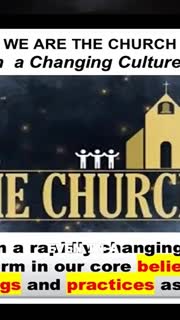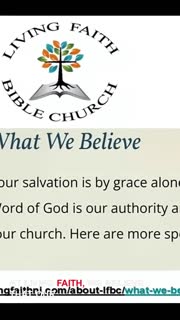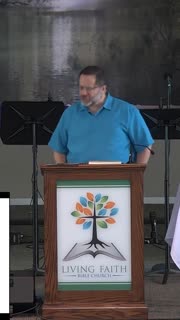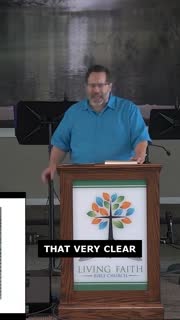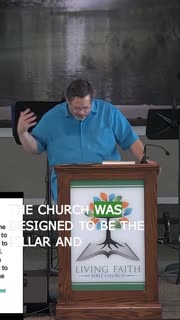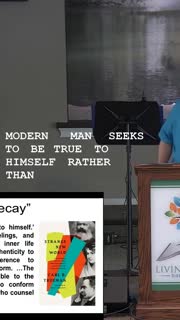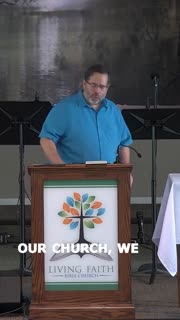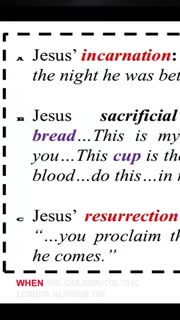Standing Firm in Our Core Beliefs as the Church
Devotional
Sermon Summary
Bible Study Guide
Sermon Clips
1) "Even in a rapidly changing culture, we are called to stand firm in our core beliefs, expressed in our teachings and practices as a church. I'm going to talk about three important words, beliefs, teachings and practices, and how it all relates to standing firm in a rapidly changing culture. So let me start with a basic question. What are the core beliefs of our church? Well, we don't hide them. They are available in our literature rack for anyone who comes to our church. They're available right on our website. And if you print them out from our website, it's about three pages, double sided." [02:30] (47 seconds)
2) "At living faith, we believe that our salvation is by grace alone, through faith alone in Jesus Christ alone. And the word of God is our authority and the sole basis for the teaching and preaching in our church. And that's the core essence of our faith, the core beliefs. Now, if you say, but where do you fit? Where does this church fit within the larger scope of Christianity and in the world? I could use four words to describe where our church fits, and each word gets a little bit narrower in terms of where we fit within the larger scope of the christian world." [03:47] (40 seconds)
3) "In a rapidly changing culture, should we remain steady in our core beliefs or change with the times? Think about the year 1962. It was a great year for Mets fans, but also for our church. That's all I'll say. 1962. Our church in this community was founded. Cedar Bridge chapel started as a home church under pastor Archie. Eventually it became the Laurelton Park Baptist Church under the long 40 plus year tenure of pastor Fisher, the Laurelton Park Baptist Church. And that ministry continues even this day. Under our current calling as living Faith Bible Church, there's that same continuity. Our name has essentially changed three times, but our core beliefs have not." [09:00] (60 seconds)
4) "The Bible makes that very clear when we turn to a book of the Bible called one Timothy. As you turn there in your bibles to one Timothy, I want to focus on chapter three. First Timothy is a book written by the apostle Paul to a young pastor by the name of Timothy to instruct him of how to manage and govern a church as a pastor. And as we dive into chapter three, we're going to see today that as a church, although we have changed our styles of ministry over the last 60 plus years, we're called in that book and in all passages of scripture to stand firm in our core beliefs, in our teachings." [14:00] (43 seconds)
5) "The church was designed to be the pillar and ground of truth. It has to represent God's revealed truth and hold unwavering to God's word, because the church is built upon God's revealed word and designed to walk in that word. The church is the pillar and ground of truth. And I believe that it is the pillar and ground of truth. Today, in a culture that is largely abandoning the notion of objective truth, resulting in what we would call truth decay." [22:00] (33 seconds)
6) "Modern man seeks to be true to himself rather than conform thoughts, feelings, and actions to objective reality. Man's inner life becomes the source of truth. Authenticity to inner feelings, rather than adherence to transcendent truths becomes the norm. The modern self, then, is not accountable to theologians who preach on how to conform oneself to God, but to the therapists who counsel how to be true to oneself. Do you see that in our culture, where we've lost this sense of objective truth with a capital t, and we've replaced it with an inner notion of my truth? I define reality by my truth. It's all around us." [23:03] (46 seconds)
7) "In our church, we celebrate two ordinances. We call them ordinances because they are two ways in which God and Jesus Christ has ordained for us to practice our faith, to reinforce our faith. One of those ordinances is baptism. And as I said, we're starting a baptism class. And if anyone is interested in expressing their faith in Jesus and believers baptism, we invite you to inquire about that. But the second fundamental practice or ordinance that we celebrate once a month in this church is called communion or the Lord's supper. And what is involved in that, and how does that reinforce our core beliefs?" [24:55] (50 seconds)
8) "When we celebrate the Lord's supper or communion, we are allowing ourselves to proclaim. Paul uses the word proclaim our faith. And what's our faith in? Our faith is in Jesus Christ as expressed in these three great truths of Jesus Christ. We proclaim his incarnation because it says in the scripture, on the night he was betrayed, we proclaim that there was this real person, Jesus, who entered history, who lived on a certain day, who acted on a certain night, who ate with his disciples and drank with them and taught with them and lived with them. We proclaim there's a real savior who came among us." [26:24] (52 seconds)
Ask a question about this sermon
2) "At living faith, we believe that our salvation is by grace alone, through faith alone in Jesus Christ alone. And the word of God is our authority and the sole basis for the teaching and preaching in our church. And that's the core essence of our faith, the core beliefs. Now, if you say, but where do you fit? Where does this church fit within the larger scope of Christianity and in the world? I could use four words to describe where our church fits, and each word gets a little bit narrower in terms of where we fit within the larger scope of the christian world." [03:47] (40 seconds)
3) "In a rapidly changing culture, should we remain steady in our core beliefs or change with the times? Think about the year 1962. It was a great year for Mets fans, but also for our church. That's all I'll say. 1962. Our church in this community was founded. Cedar Bridge chapel started as a home church under pastor Archie. Eventually it became the Laurelton Park Baptist Church under the long 40 plus year tenure of pastor Fisher, the Laurelton Park Baptist Church. And that ministry continues even this day. Under our current calling as living Faith Bible Church, there's that same continuity. Our name has essentially changed three times, but our core beliefs have not." [09:00] (60 seconds)
4) "The Bible makes that very clear when we turn to a book of the Bible called one Timothy. As you turn there in your bibles to one Timothy, I want to focus on chapter three. First Timothy is a book written by the apostle Paul to a young pastor by the name of Timothy to instruct him of how to manage and govern a church as a pastor. And as we dive into chapter three, we're going to see today that as a church, although we have changed our styles of ministry over the last 60 plus years, we're called in that book and in all passages of scripture to stand firm in our core beliefs, in our teachings." [14:00] (43 seconds)
5) "The church was designed to be the pillar and ground of truth. It has to represent God's revealed truth and hold unwavering to God's word, because the church is built upon God's revealed word and designed to walk in that word. The church is the pillar and ground of truth. And I believe that it is the pillar and ground of truth. Today, in a culture that is largely abandoning the notion of objective truth, resulting in what we would call truth decay." [22:00] (33 seconds)
6) "Modern man seeks to be true to himself rather than conform thoughts, feelings, and actions to objective reality. Man's inner life becomes the source of truth. Authenticity to inner feelings, rather than adherence to transcendent truths becomes the norm. The modern self, then, is not accountable to theologians who preach on how to conform oneself to God, but to the therapists who counsel how to be true to oneself. Do you see that in our culture, where we've lost this sense of objective truth with a capital t, and we've replaced it with an inner notion of my truth? I define reality by my truth. It's all around us." [23:03] (46 seconds)
7) "In our church, we celebrate two ordinances. We call them ordinances because they are two ways in which God and Jesus Christ has ordained for us to practice our faith, to reinforce our faith. One of those ordinances is baptism. And as I said, we're starting a baptism class. And if anyone is interested in expressing their faith in Jesus and believers baptism, we invite you to inquire about that. But the second fundamental practice or ordinance that we celebrate once a month in this church is called communion or the Lord's supper. And what is involved in that, and how does that reinforce our core beliefs?" [24:55] (50 seconds)
8) "When we celebrate the Lord's supper or communion, we are allowing ourselves to proclaim. Paul uses the word proclaim our faith. And what's our faith in? Our faith is in Jesus Christ as expressed in these three great truths of Jesus Christ. We proclaim his incarnation because it says in the scripture, on the night he was betrayed, we proclaim that there was this real person, Jesus, who entered history, who lived on a certain day, who acted on a certain night, who ate with his disciples and drank with them and taught with them and lived with them. We proclaim there's a real savior who came among us." [26:24] (52 seconds)
